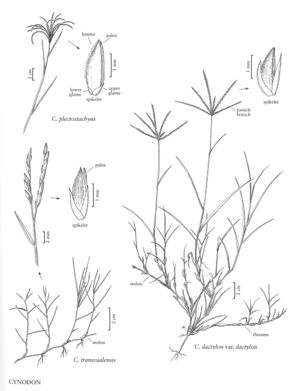Cynodon plectostachyus
Plants stoloniferous, not rhizomatous; stolons to 2 mm thick, arching. Culms 60-100 cm tall, 1-4 mm thick, glabrous. Sheaths mostly glabrous or sparsely to densely pilose, with long hairs adjacent to the ligules; ligules 1-2 mm; blades to 30 cm long, 4-8 mm wide, both surfaces scabrous and densely pubescent. Panicles with 6-20 subdigitate branches; branches 3-10 cm, in (1) 2-7 closely spaced whorls, axes triquetrous. Spikelets 2.5-3 mm, closely imbricate; rachillas prolonged, glabrous, sometimes terminating in a vestigial floret. Lower glumes 0.1-0.3 mm; upper glumes 0.4-0.6 mm; lemmas 2.4-3 mm, keels not winged, keels and margins pubescent, hairs 0.3-0.4 mm; paleas stiffly ciliate on the keels. 2n = 18, 36.
Discussion
Cynodon plectostachyus is native to tropical Africa. Its status in the Flora region is unclear. The records shown are from non-cultivated plants, but it is not known whether they represent established populations. Cynodon plectostachyus is not frost-tolerant.
Selected References
None.
Lower Taxa
"decumbent" is not a number.
